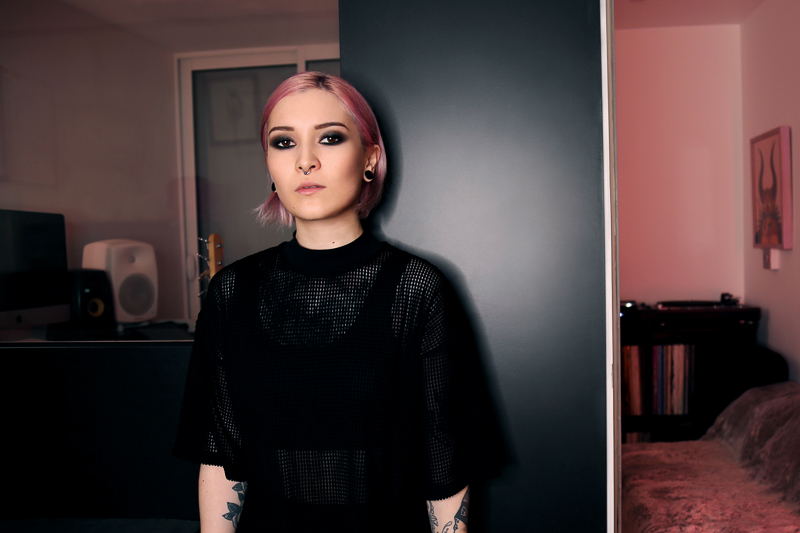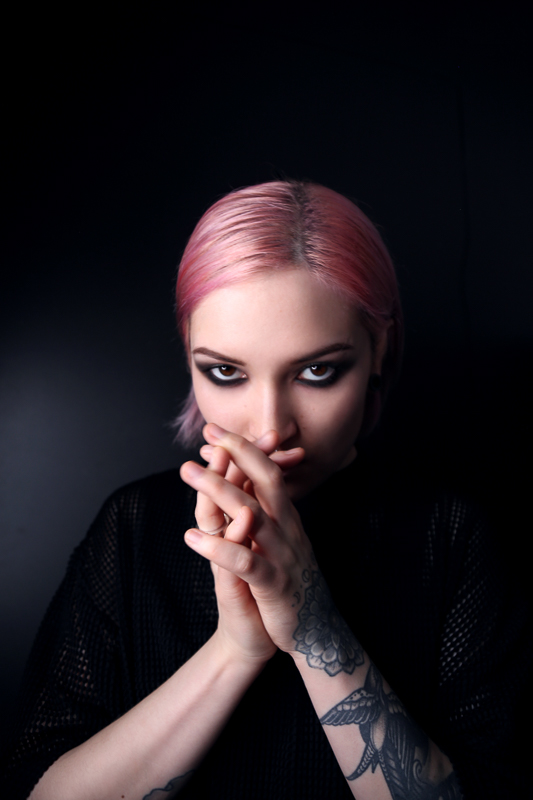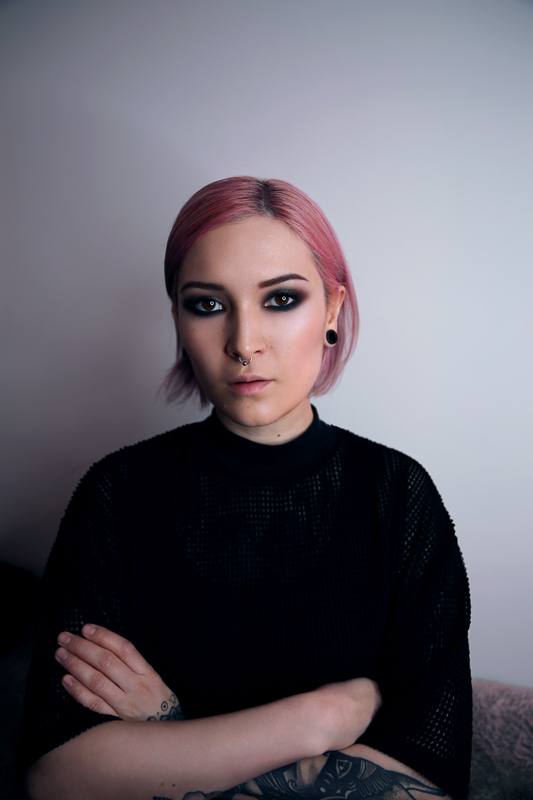‘Maya Jane Coles’ Nocturnal Sunshine – Photoshoot & Interview

Words: Will Soer
It’s a cool, late summer’s evening, and this does feel strange. I walk between sparse, sharp, modern apartment blocks on my way to interview Maya Jane Coles, her signature beats playing through my headphones; delicately crafted, emotionally layered, rhythmically devious. She’s about to punctuate a decade hot-streak of bewitching records and massive, hyperintense DJ sets, with an album released under her genre-fluid Nocturnal Sunshine pseudonym. Full Circle will shock hardcore fans, and make immediate, beautiful sense. The introverted producer is known around the world for her inimitable tone, a melodic character that maintains across tempos and structures. She rarely gives interviews. I couldn’t find anything in-depth online from the last four years, although I know there have been highs and lows.
I ascend to the fourth floor of a quiet building, and Maya welcomes me into her flat. She flicks a switch, exposing a quiet, neat living room; her girlfriend [Caroline Ramos, who conducted the photoshoot for this piece here] is giving us space. I ask if the lights are for me; the London Underground tires my eyes, I much preferred it beforehand. She switches back to the ambient lighting, before leading me to a tiny home studio, the ‘happy place’ where she often works overnight. I sit on the small furry seat built into its corner, next to a Pusheen plushie twice the size of a housecat, underneath a menacing portrait of a blue-skinned Predator, baring its 80s horror-alien teeth. She sits at her desk, flanked by shelves of sleek machinery, plays me a few cuts from the album and grins. Afterwards, we return to the living room and discuss the foundation of her sound.
‘My earliest memory with loud music that wasn’t in the house was actually Notting Hill Carnival! I grew up super close to the route, from when I was 3 or 4 years old my Dad would take me every year, it kind of totally makes sense. I’d be sitting on his shoulders, ‘can you feel the bass?’, and I would be like *breathily* ‘yeahhhh!’, thinking it’s incredible. He had one friend who’d have heavy metal playing when we drove around in his car, I remember repeatedly asking for the tapes. One day he made me this cassette mixtape of all these bands he was listening to, I was about 6 and I would play it off my Fisher-Price cassette player, stomping around the house. My knowledge of basic 80s pop music is actually really lacking because I never grew up with any of that, it was all quite alternative.’
Around the age of 14 years old, Coles started making beats, taking any opportunity in the years since to burrow away in the studio, gradually building hundred of libraries of bespoke sounds. Alongside her lunar aesthetic, Full Circle’s title reflects Maya’s return to the music that originally made her want to produce (Trip Hop, Timbaland, Missy Elliott), the music she focussed on before stumbling upon cult status in the world of Deep House, aged 19. She’s loved her journey though; DJing was an immediately natural fit, and record labels’ desperate requests for music that sounded like this or that was no chore to her. Maya finds different therapies in different sounds; channelling her memories and thoughts into some tracks, and meditatively exploring sound on others. This flexibility has allowed her to make sonic dreams reality, along with the savvy maintenance of a personal brand; ‘having other outlets means you can kinda bend and break the rules in a way that you want and won’t have to worry about keeping things a real business.’ This business has culminated in an album packed with the most potent swagger she’s ever put on record, emboldened by verses from rap queens both new (Young MA) and OG (Three 6 Mafia’s Gangsta Boo). When I ask to hear the track she’s most excited about, she immediately plays one featuring both MA and Boo, obviously excited to share the product of all this work, most of it fun.
Press work, on the other hand, is rarely fun. The pressure of one-sided Q&As, the discomfort of journalistic edits and recontextualizations that change her words’ meaning, few introverted artists look forward to it. Thankfully conversation flows easily, but Maya doesn’t talk with the rehearsed ease of a confident self-promoter. She’ll often follow an answer by re-tucking her hair behind her ear, taking a short breath and resetting her posture. This makes sense; a rare artist who writes, produces and engineers her own music, she’s used to total expressive control, having mastered her own tracks ever since she was a teenager. Some of these very early tracks are currently being offered to major label artists via Sony ATV; ‘it’s funny, some of them I’ve rearranged, because my mixdowns are all over the fucking place, the weird thing is I don’t cringe at the compositions. There are a couple of tracks on Full Circle that actually sample key elements of tracks from like 10 years ago.’
Starlight, the final track on Coles’ previous album Take Flight, was born this way. It began as a guitar sketch in her previous flat’s bedroom studio, just across the road from her current home. Years later, a week before the vinyl was cut, she revisited the recording and ‘instantly’ a song appeared. The mixdown didn’t happen instantly, it was work as always, but she liked the song so much that she forced herself to do it in time. This resulted in a song adored by fans, and impossible for me to shake; there are certain times when I struggle not to listen to it, to resist that tidal whirlpool of dark twirling soul. I explain this addiction with reference to Jessica Hopper’s 2002 article I Have A Strange Relationship With Music; ‘the sticky joy garnered only from Timbaland beats.’
‘It’s funny you say that, because my goal with a track is to basically make you feel like you have to repeat it, that’s when I know it’s getting somewhere. I guess for me with finishing tracks, a lot of the time I’ve listened to it hundreds of times and finished it, and I’m sick of it, which means I shouldn’t release it. If I still really want to listen to it then it’s, for me, worthy of putting on an album.’
The other irreplaceable quality Hopper talked about in that article was euphoric catharsis; purging one’s painful emotions, owning them, revelling in their intensity. Starlight will always be connected in my mind with another song that I rinsed over the last few years, Phoebe Bridgers’ Motion Sickness, with its chorus ‘I have emotional motion sickness, somebody roll the windows down.’ I ask if Maya sees a similar situation in that track.
‘The whole period of making, I mean… Take Flight was a very gradual process, it’s not like I set aside four months to make it. It covered a long timespan of different situations and emotions. But when I was wrapping that album it was a particularly turbulent time, because it was just after releasing that, or actually it’s blurry now whether it was during the release or after, my mum passed away.’

Later on we discuss her work-life balance; she’s just had her first summer without gigs every weekend, spurred on by her girlfriend moving to London. She mentions that before this they had done long distance for a year, I put two and two together and ask if they started dating around those difficult times.
‘Yeah she was my rock through that whole, crazy time to start a relationship. It obviously wasn’t planned, like ‘I’m depressed, I need to be with somebody!!’’
Is that why Take Flight has that weird balance of sadness and romance?
‘It’s bittersweet because my Mum heard most of that album. She died of cancer and the last 6 to 8 months she wasn’t even capable of listening to music, once it spreads to the brain your hearing and vision is total fucked, but she had listened to it on repeat when the majority of it was finished. I’ll always know she loved the album, it’s a real special album to me. But Caroline was definitely a big part of that release too. Afterwards I was making crazy depressing, emotional stuff, it just went deeper and deeper, but I haven’t put those on any official release. Sometimes the music that’s most personal, I don’t want to release in that moment, I have to give it enough time to detach before I’m comfortable to share it with the world.’
I guess it would be more apparent if you were doing the mixdowns wrong on those tracks, if whilst being finished off they lost their emotional truthfulness.
‘It shows me that music is what makes me happy, I’m just lucky enough to do it as a career. Although when I was going through a lot a couple of years back, I neglected everything and didn’t start making music until I was able to reenter that space. I realised that when I am making music like that, if I start something, I have to get most of it down, and really be in that moment and be feeling it. I find it too difficult if I leave it later to put myself in there again.’
You weren’t making music but you were still DJing, how come?
‘At that time, it was just about keeping myself busy enough to not dive into depression and wallow too much, but at the same time you do need to give yourself a bit space. As a touring artist it’s normal to have to suck in a lot of emotion because people aren’t paying you to come to the club and be all miserable, you’ve gotta give them that energy that they want, regardless of what might be going on in your personal life.’
There were bits on Full Circle tracks, like the one with CHA$EY JON£S, where through the rapping a synth would pop up, it kinda sounded like you ad-libbing, like the producer equivalent of shouting ‘SKRRT SKRRT!!’ In these sessions, were you and the vocalists reacting to eachother?
‘Chasey hasn’t released anything, he just started making music again, but we’ve known each other for 18 years now; in the studio it’s just the same thing, we’ll record stuff and I’ll scream like ‘no no no no, yeah yea yea yeah, do it!!’ we’ll be laughing, taking the piss. It’s really nice to make music like that when it’s just so chill, you just whack loads of ideas down, go through loads of tracks. It’s really productive, even though it just feels like messing around you’ll have five finished tracks in two hours. You don’t get that with many artists, that’s why I like to repeat collaborations with people, the more you do the better the collaboration will get. That’s why Chelou is on the album, Catnapp is on the album, you know what you’re gonna get.’

I guess with someone like Young MA, you already know their style really well through heavy listening.
‘I mean that track [Pull Up] came together quite naturally, they both just nailed their parts. Gangsta Boo was just on it as the only feature, and I think Young MA is just amazing, ages ago I was thinking I’d love to get her on a track, and it just happened very recently that some of my label guys could get in touch.’
Has this stuff been therapeutic in terms of purging difficult emotions, or escaping them, being in the moment now?
‘On a lot of it, I’m focussing a bit less on emotion and intimate stuff on Nocturnal Sunshine, it’s kinda my edgier side. It’s definitely got more of a fun approach. It’s weird, when I’m not putting my name to it, it can be whatever it wants, I think it’s more relaxed. Even though it’s less personal, it’s musically more me.’
Full Circle is out now. Maya Jane Coles will playing an intimate set at London’s Night Tales on December the 21st.
If you want to learn more about her musical process, check out Resident Advisor’s recent interview.